Jim Crow Museum
1010 Campus Drive
Big Rapids, MI 49307
[email protected]
(231) 591-5873
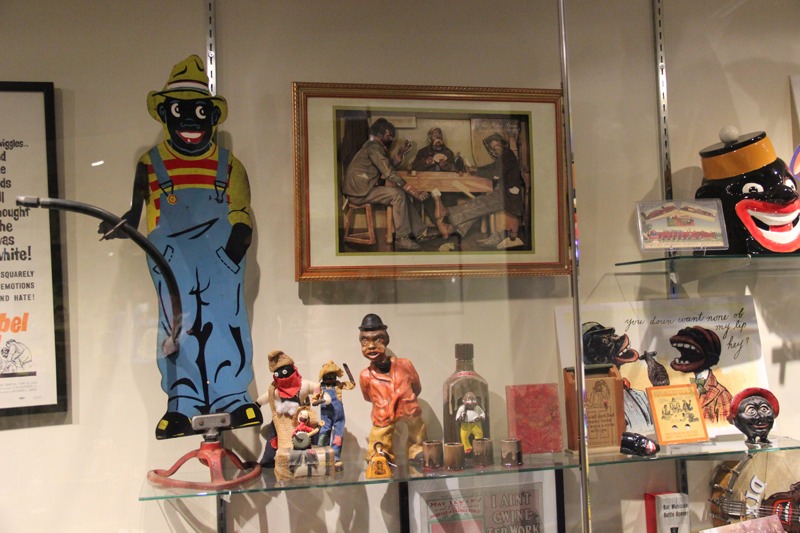
I was watching the Jim Crow Museum video and I'm interested to know if you have any information about the "hose holding" object, the African American male “Tom” figure that can be hooked up to a garden hose and (presumably) spin around if water is turned on?
~Lisa S. Chicago, Illinois
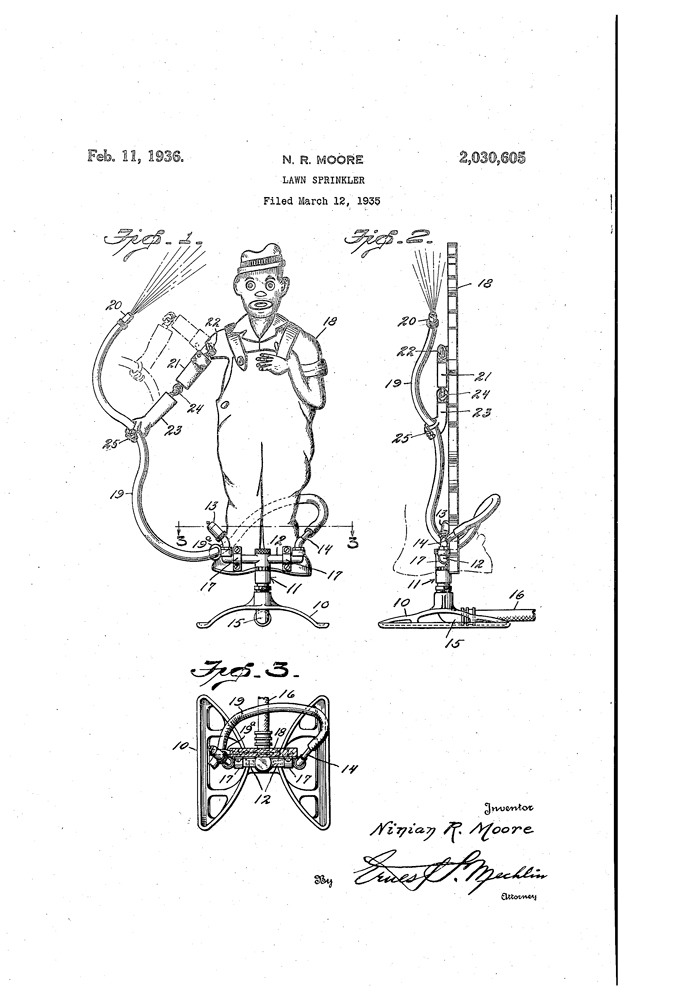
Thank you for contacting the Jim Crow Museum. If I understand correctly, you are asking for information on one of the lawn sprinkler items in our collection. It was sold under the name Sprinklin’ Sambo or Sprinkling Sambo from approximately 1936—when the inventor Ninian R. Moore received a patent for it—until probably no later than the mid-1950s (Moore, US Patent, 1936). Tracking down the manufacturer is challenging because there were at least three companies producing these items, one of whom—the Firestone Tire and Rubber Company—made both a wood and a metal version. Wayne H. Lewis & Son of Cleveland Heights, Ohio, manufactured many of the surviving metal ones. The wood versions did not survive well as an outside object subject to water and the elements; we are fortunate to have a couple that did survive. The metal versions that I’ve seen all have a small rectangular box or space on the lower left corner of the back of the figure where the manufacturer information is listed; however, I’ve seen a few where the box was blank. The metal version that the Jim Crow Museum owns was produced by Pla. Wood Products Co., Painsville, Ohio; I have no other information about the company.
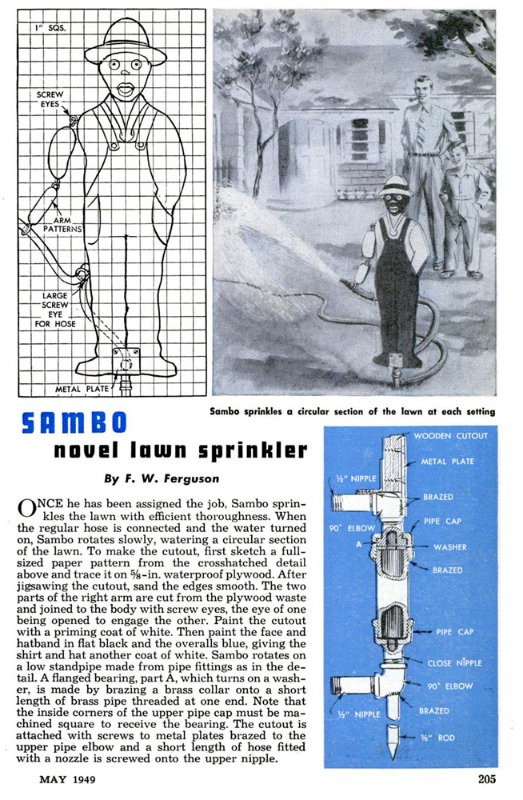
I found a write up about the “Sambo Sprinkler” in a May 1949 issue of Popular Mechanics (Popular Mechanics, May 1949). The article provides instructions on how to sketch and paint Sambo onto waterproof plywood and attach the Sambo to the watering hose mechanism, in order that Sambo will be “assigned the job” of sprinkling the “lawn with efficient thoroughness.”
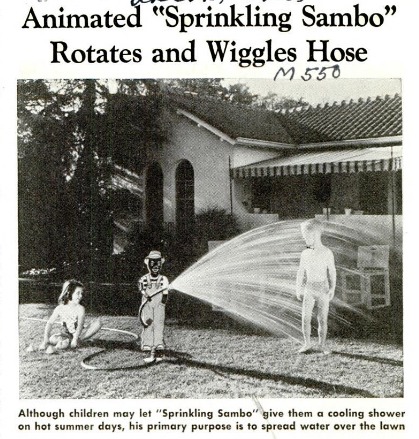
In a September 1942 Popular Mechanics article the “Sprinkling Sambo” is shown giving children a “cooling shower on hot summer days” as the object watered the lawn. Here is the interesting write up in Popular Mechanics:
“Silent, black-faced comedy has been introduced into the serious business of lawn sprinkling with a wooden colored boy who holds the nozzle and distributes water evenly about the lawn and garden. The smiling midget, powered by the force of water, turns round and round, while his double-jointed right arm swished the nozzle in rhythmic motions. Occasionally the animated comedian reverses the direction of his rotation as if to spray extra water on a spot he had missed. The tempo of his gyrations can be stepped up or diminished by varying the water pressure. Standing 33 inches high and wearing a patched red, blue, yellow and black costume, the whirling figure can be anchored to the ground in any part of the lawn by two spikes inserted through a flat base” (Popular Mechanics September 1942).
The “Sprinklin’ Sambo” was also advertised in a June 1942 issue of Life Magazine through Firestone as a value for the garden and recreation (Life June 29, 1942). From the early 1940s through the early 1950s the “Sprinkling Sambo” a “novelty Sprinkling Sensation” was advertised in a number of newspapers throughout the country (The Post-Register, May 22, 1942). Later, along with “Sprinkling Bozo,” a monkey in an organ grinders’ suit, the sprinklers were advertised in newspapers with the tagline of “The only Lawn Sprinkler that makes people stop, watch, and smile” (The Daily Times-News, August 29, 1946).
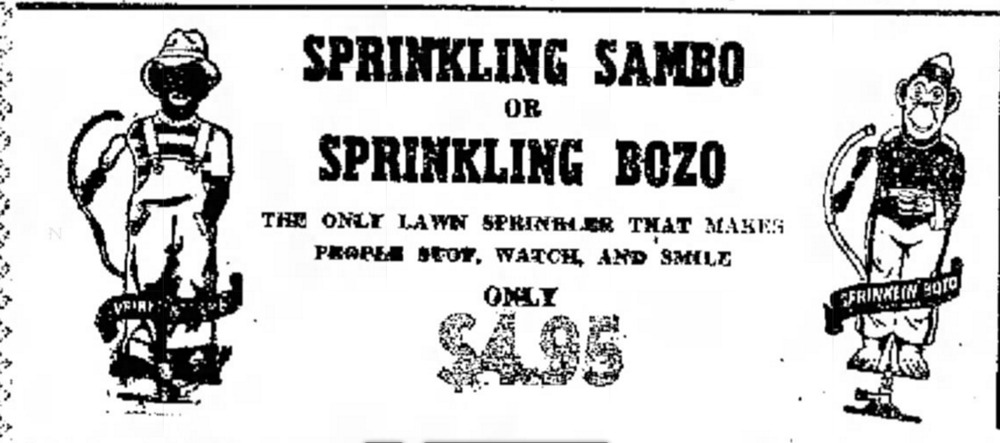
I did want to mention that we do not categorize this object as a Tom caricature; rather, we identify the imagery as the Sambo version of the Coon caricature. The term “Sambo” is actually a caricature on its own, but the distinctions between a Sambo and a Coon are not always clear. Sambos are portrayed as lazy and ignorant, but also often content in their laziness, if that makes sense; they are generally seen as happy-go-lucky slackers, with no greater need than a watermelon. They are not malicious or threatening. Coons are also portrayed as lazy and ignorant, but primarily also malcontents, shiftless, cultural parasites; they are the ones likely to break the masters’ tools and claim they can’t do the work. They are often shown stealing the watermelons, and can be portrayed as malicious and threatening. We’ve placed the sprinkler in with the Coon caricatures primarily because it is the best fit in our collection, but the most accurate term would be the Sambo. I hope this helps.
Please feel free to let me know if I can be of further assistance.
Regards,
Lisa M Kemmis
Museum Assistant
Jim Crow Museum
Ferris State University
2017